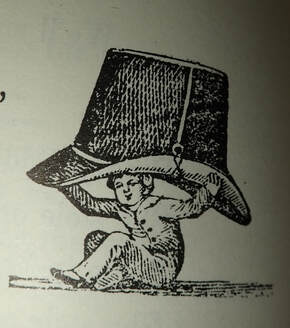|
Can anyone argue that humans come with music and dance already pre-loaded?
6 Comments
There's a Calvin and Hobbes cartoon that I clipped from the newspaper (they used to print newspapers on paper called "newsprint." So quaint!) and have kept for innumerable moves. The strip is simple...Hobbes burbles on about the word "smock," while Calvin grows increasingly irritable about it.
Never mind the wonderful world of profanity. (Profanity as a word, let me remind us, started life as a description of irreligious language. It would mean profaning a deity or a religion. Only as time went by did it come to mean bodily vulgarity.) So many highly enjoyable ways to express discontent or contempt using those seven or so words...
But as far a favorite words I can use in mixed company, I favor "confabulate." Indeed I do. It's a mouthful, this Latinate word that sounds a fabulous convict, but no. It came from "tabula," a tale and a table, joined with "com," which means "together," but which gets changed to "con" for ease of speech. In the original Latin (one original Latin, anyhow), it was "confabulari" and it meant to talk about something or another. Like chatting or chattering or burbling. In a rare Oz moment, American slang shortens the word to "confab." One might say, "We're having a confab, Mom, just leave the snacks at the door." Then in 1900 or so, the word took up a new job: describing a clinical behavior of making up stuff to fill gaps in memory. A person with dementia is said to confabulate when telling you that he was in the Bolshoi ballet, say, and a spy for the Allies, when you're quite sure he was a dentist in Cincinnati born after the war, with a bum leg to boot. Confabulation is a coping mechanism for people with failing memory. It works to help patients make sense of the world; they generally do not even know that they are telling a tale. Unlike a garden-variety lie, which assumes intent, confabulation is not a conscious choice. It's not just the result of brain injuries, btw. Confabulation comes to play when people are striving to make a correct answer. Which is partly the challenge with eye-witness accounts. As a species, we like to be right.
How peculiar that thinking about confabulation brings me yet again to Joan Didion. (If you haven't read "We Tell Ourselves Stories To Live," I am sorry for you. Confabulation topic sidebar: What if Joan Didion was THE deity?)
Okay, egg-heading over. I also like the word "spanakopita," but you don't catch me babbling on about it. Yet more confabulating articles: https://www.frontiersin.org/articles/10.3389/fpsyg.2017.01207/full https://aeon.co/ideas/confabulation-why-telling-ourselves-stories-makes-us-feel-ok http://www.bbc.com/culture/story/20190527-can-fiction-really-improve-your-mental-health This time of year, you're apt to overhear a lugubrious but truncated version of "Happy Holidays" around our house. Not that Andy Williams doesn't already win in those dubious lugubrious stakes, but ugh, I can't stand that song. One of us will start belting it out and then, if it's me, stop and swear briefly. Every year, the third week of December rolls around and somehow, this annoying song gets onto my internal jukebox. And because that's how I play, the words of the song get a quick change-up, so I'll unwittingly start singing, "Hippy Hoppodays!" only to stop, swear briefly, and try to change the channel. Without resorting to "The Girl from Ipanema," of course. For instance, I might try for a sarcastic version of "Here comes Santa Claus" or a full-on 39-and-a-half-foot-pole version of "You're a Mean One, Mr. Grinch." Thurl Ravenscroft rocks. Or possibly the most upbeat offering of the season, Bare Naked Ladies' "God Rest Ye Merry Gentlemen." May your winter holidays be joyful and full of good noise.
A title like that and you're still reading? Bless you! I hope I can make it worthwhile. As a rule, I prefer to share stuff I adore. Rare finds. Unlikely but likable things. Unexpected pleasures. Books that I think deserve a wider readership, for instance, or experiences that I'd like to encourage others to have. But that basic human urge to share the other side --the irresistible impulse that says, "Jeepers, this stinks! Sniff it!" Is there a Germanic term for this instinct , like schadenfreude? There ought to be. It would be generous to imagine that our impulse to share things revolt the senses is like –– as the old phrase has it, trouble shared is trouble halved. But I don't guess kindness is any part of the underlying motivation. I believe the reason we love sites like cake wrecks and people of Walmart is NOT to reduce the shock one feels. Sharing amplifies that shock but also, like a clever party-goer, scrapes off the offending image or scent onto someone else. Here, look, isn't it awful?! So when I say the three worst songs in my music history are as follows, I am not simply trying to entertain.
And as a bonus, because back when irreverent reporters waited for results or otherwise idled in the Sports Department of The St. Petersburg Times, the game we played was to pick the line-up for the band that was playing in Hell. Karen was always on the skins. I have a high tolerance for foreign language music. Here are a couple of selections that are fairly heavy rotation. The first is from that marvelous animated film The Triplets of Belleville. And, though it's hard for me not to reference John Prime's infectious Let's Talk Dirty in Hawaiian, some Iz cannot go awry. Especially when a person has been studying the uke for a few months now... And to round out the trio, I was torn between a short documentary about Dancehall music in Japan (after all, I went down this rabbit hole, might as well bring back a treat...) and an Australian video that shows you how to sing Despacito using English words, which is, by the way a work of genius. Remember the television ad, "If you can spell socks, you can speak Spanish!"? Somebody certainly has not been measuring out his life with coffee spoons! Anyway, none of that is on my actual playlist. But this is:
But back to this particular song. Pilot's soaring and incessant declaration ("Oh! Ho! Ho! It's magic!") played in counterpoint to the couple of weeks of prep and racing of the 2019 Transpacific ocean Race –– the Transpac. Because of course, my favorite skipper sailed this 2250-mile-long offshore race aboard the famous Bill-Lee-designed Merlin*.
The boat could hardly have been better prepared for the trip from Long Beach, California to Honolulu, Hawaii: the crew included two fire-fighters among her experienced and talented team; new sails; higher degrees in engineering, MacGyvering, and meterology; a redesigned physical plant and dozens of Pacific passages under her keel; extra duct tape and A & D ointment; and the latest in safety gear and information technology And yet. It's not a safe world and we all need some good luck to get us along. Sailors especially. So while playing brave little toaster on shore, I wasn't about to ignore the encouraging messages of a magical world. Just because it's magical thinking doesn't mean it's not true, right? Like the song says. Oh! Ho! Ho! In a mere 8 days, Merlin's race was run. Several Transpac boats retired because of technical difficulties. One of the catamarans ran into a mysterious nighttime something and tore a hole in her bow. Another boat actually sank (the sailors were rescued by their competitors, naturally, because, well –– sailors). Nobody, thank goodness, was lost at sea. Merlin finished a quite respectable third; their stories range from the sublime (rainbows around the moon) to the ridiculous (anything to do with using the head, also, two people beaned by flying fish). They shredded some sail and lost their electronics for a bit, but it worked out safely in the end. Here's the link to the Transpac YC's amazing images of Merlin. And a brace of BCR for your listening enjoyment:
It's a beautiful world.
A little something musical that I am enjoying. The band is "Dark, Dark, Dark."
Go on, turn the news off for a few minutes. Turn this up, dance around, make a list of all the things you love. Then, I dunno, maybe consider giving up expressing your outrage for a whole day?
Perhaps take stock of the way the air is moving outside? Or think about a song that YOU cannot resist. (And by the way, I want to know what song that is...) Peace out. It surprises me when someone says, "Oh, I don't know the words. I just listen to the music."
PS: And on the other hand, we have songs like Louie Louie. The words are so indistinguishable that you can put whatever comes to mind into those slurred lines, and all you are left with as a listener is a passionate understanding for the need to leave. I know it's supposed to be a sea-shanty, but honestly it could just as easily be a call to take up needlepoint or remove potatoes from the stove. Wooah, baby, me gotta go.
|
About the Blog
A lot of ground gets covered on this blog -- from sailboat racing to book suggestions to plain old piffle. FollowTrying to keep track? Follow me on Facebook or Twitter or if you use an aggregator, click the RSS option below.
Old school? Sign up for the newsletter and I'll shoot you a short e-mail when there's something new.
Archives
June 2024
Categories
All
|


 RSS Feed
RSS Feed
